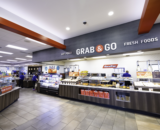The chief executive of RaceTrac will testify today before the U.S. House Committee on Agriculture that the convenience store industry plays a critical role in the Supplemental Nutrition Assistance Program (SNAP) by providing a convenient place for economically disadvantaged citizens to purchase food.
RaceTrac Chief Executive Officer Max McBrayer, Jr. is scheduled to testify at 9 a.m. March 11 before the Agriculture Committee that convenience stores help alleviate food insecurity in the United States by providing 24-hour food access for SNAP beneficiaries, especially those living in rural areas.
NATSO members can watch the hearing beginning at 9 a.m. here.
RaceTrac and RaceWay stores provide nearly 1,700 SNAP-eligible food products at 750 locations operating in 11 states throughout the Southeast United States. RaceTrac’s stores, which are open 24 hours a day, process roughly 3 million EBT transactions per year.
“No American should go hungry,” RaceTrac CEO Max McBrayer, Jr. said in his written testimony submitted in advance of the hearing on Food Insecurity in the America.
RaceTrac’s participation in SNAP enables beneficiaries to access food without excessive inconvenience or expense. Low-income Americans often work – and shop for food – during unconventional hours. The convenience store industry accommodates this. RaceTrac stores are often the only easily accessible retail food store located in a particular area and are consistently open longer than other large-format food retailers and thus provide extended hours during which customers can access food.
Headquartered in Atlanta, Georgia, RaceTrac is a family-owned business that has been serving guests since 1934. RaceTrac, together with its franchise-brand RaceWay, operates over 750 convenience stores in 11 states and employs nearly 10,000 people. The vast majority of stores are open 24 hours a day, seven days a week and contribute to a variety of communities throughout the southeast United States.
Amid the COVID-19 pandemic, the percent of SNAP transactions at RaceTrac stores has doubled, according to McBrayer. Among the overall increase in SNAP purchases among adults, RaceTrac said it has experienced an increase in SNAP purchases by homeless adults as well as an increase among students who use EBT before or after school to purchase snacks or lunch.
“COVID-19 has exacerbated what was already an unacceptable situation,” McBrayer said in written testimony.
“It is clear to all of us at RaceTrac that many of our guests have been struggling to make ends meet and are experiencing food insecurity,” McBrayer said. “SNAP benefits are critical to ensuring that our most economically vulnerable citizens have access to the food they need.”
Truckstops, travel plazas and convenience stores were deemed “essential critical infrastructure” by the Cybersecurity and Infrastructure Security Agency (CISA), and have remained open throughout this pandemic, providing food and fuel to the public.
Read the complete statement for the House Agriculture Committee here.
Subscribe to Updates
NATSO provides a breadth of information created to strengthen travel plazas’ ability to meet the needs of the travelling public in an age of disruption. This includes knowledge filled blog posts, articles and publications. If you would like to receive a digest of blog post and articles directly in your inbox, please provide your name, email and the frequency of the updates you want to receive the email digest.

